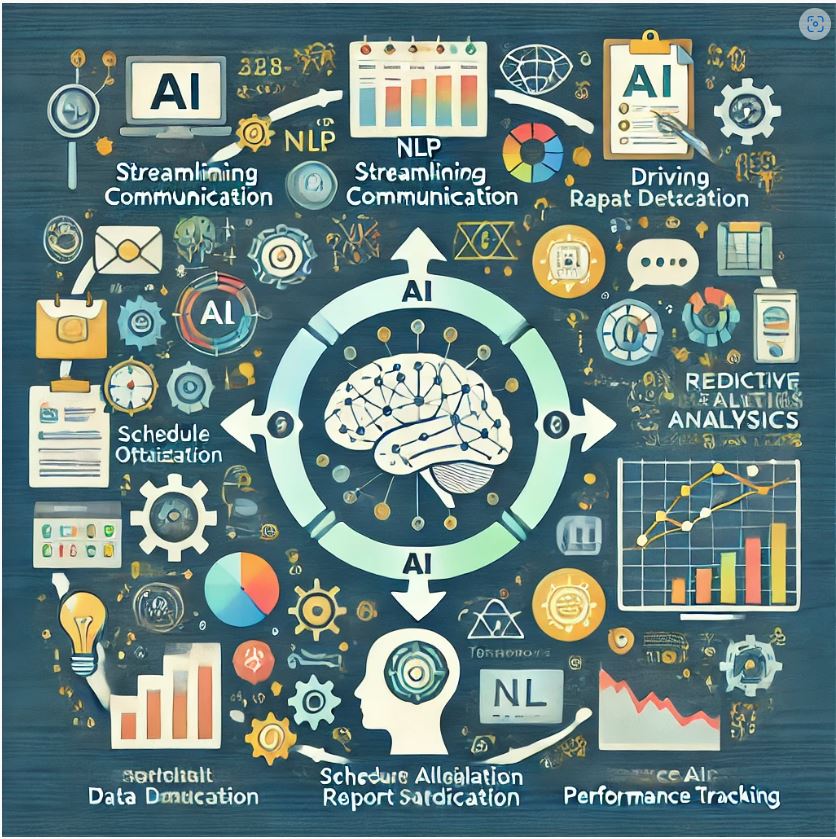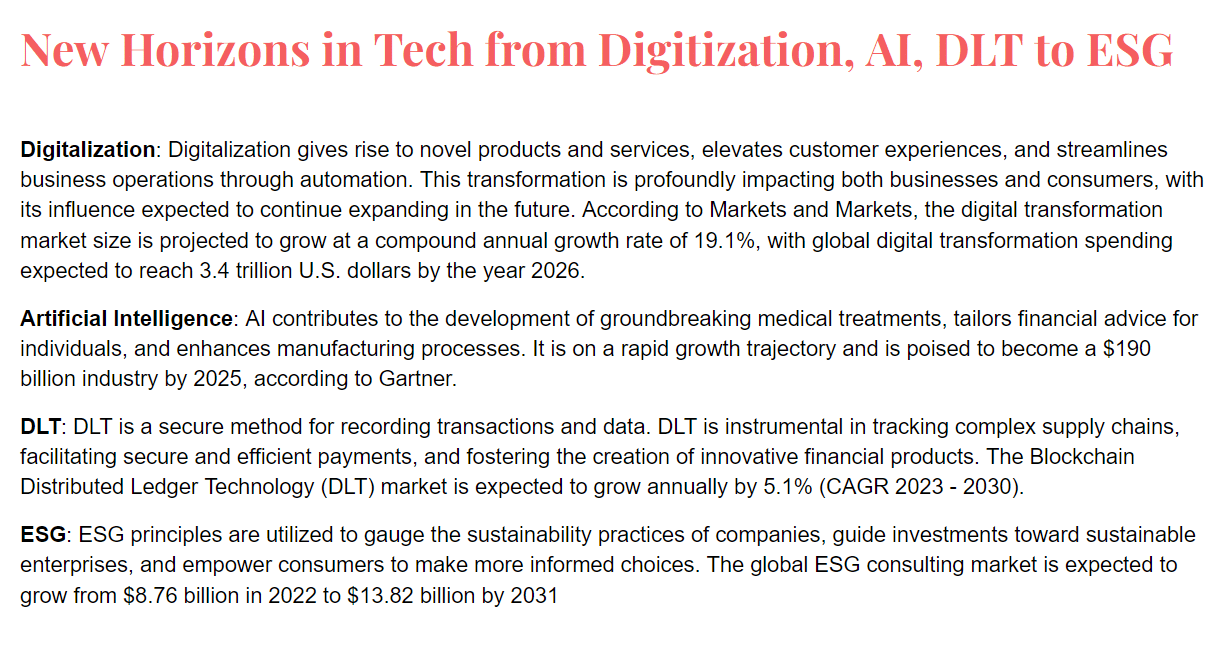
Artificial Intelligence (AI) is no longer a futuristic dream; it is actively reshaping IT project management today. For IT project managers leveraging AI can drive efficiency, enhance decision-making, and improve project outcomes. This guide explores how AI can be integrated into each phase of the Project Management Institute (PMI) framework, highlighting practical use cases and key AI tools.
The Role of AI in Project Management
AI encompasses a variety of models, including:
- Natural Language Processing (NLP): Automates documentation, extracts insights, and analyzes stakeholder sentiment.
- Machine Learning (ML): Predicts risks, optimizes schedules, and enhances decision-making.
- Computer Vision: Automates defect detection and UI testing in software projects.
- Predictive Analytics: Analyzes historical data for forecasting and trend detection.
The benefits of AI include increased efficiency, early risk detection, optimized resource allocation, and improved stakeholder communication. However, AI adoption requires careful consideration of data quality, ethical implications, and human oversight.
AI Across the Project Lifecycle
The following table maps AI models and tools to PMI’s process groups and knowledge areas:
| PMI Process Group | Knowledge Area | AI Model/Tool | Use Case |
|---|---|---|---|
| Initiating | Stakeholder Management | PMI Infinity, ChatGPT-4, MonkeyLearn NLP | Identifies key stakeholders and their attitudes toward the project. |
| Planning | Scope Management | IBM Watson NLP, Make.com Process Automation | Analyzes requirements to suggest Work Breakdown Structures (WBS). |
| Schedule Management | Microsoft Project AI, Asana AI Predictive Scheduling | Estimates task durations and optimizes project schedules. | |
| Cost Management | Oracle Primavera AI, PredictHQ Forecasting API | Forecasts project costs based on historical data. | |
| Risk Management | RiskLens AI, ChatGPT-4 for Risk Classification | Identifies and assesses project risks. | |
| Resource Management | Runn AI Resource Manager, Float AI Scheduling | Allocates resources based on availability and skills. | |
| Executing | Resource Management | ClickUp AI Workload Manager, monday.com AI Assistant | Detects inefficiencies in resource usage. |
| Communications Management | ChatGPT-4, Grammarly AI for Business Reports | Automates meeting summaries and stakeholder responses. | |
| Stakeholder Management | Brandwatch AI Sentiment Analysis, MonkeyLearn | Monitors stakeholder feedback in real time. | |
| Monitoring & Controlling | Integration Management | PMI Infinity, Tableau AI Analytics | Tracks project metrics, flags deviations. |
| Schedule & Cost Control | Planview AI, Smartsheet AI Forecasting | Identifies delays and cost overruns. | |
| Risk & Resource Control | RiskLens AI, Anodot Anomaly Detection | Reassesses risks and detects unusual resource patterns. | |
| Stakeholder & Communications Control | ChatGPT-4, Talkwalker AI | Ensures stakeholder engagement remains positive. | |
| Closing | Integration Management | Make.com Automation, Jasper AI Reports | Generates project closure reports and insights. |
| Quality Assurance (Software Dev) | Applitools AI for Visual Testing, Testim AI | Automates UI testing and defect detection. |
Applications for AI-Powered Project Manager
1. Initiating: AI for Stakeholder Analysis
- AI-powered sentiment analysis can process emails, surveys, and social media feedback to gauge stakeholder engagement.
- Example: IBM Watson NLP tools help companies assess customer and stakeholder sentiment in real time.
2. Planning: AI for Schedule & Cost Forecasting
- Predictive analytics tools such as Microsoft Project AI improve scheduling accuracy.
- AI-driven cost estimation can reduce budget overruns by up to 20% (Source: McKinsey & Company).
3. Executing: AI for Resource Management & Communication
- AI-driven chatbots can automate meeting summaries, reducing manual work by 30%.
- AI-based resource optimization tools ensure the right person is assigned to the right task.
4. Monitoring & Controlling: AI for Risk & Performance Management
- AI-driven predictive models can flag potential risks before they escalate, improving risk mitigation by 25%.
- AI-powered dashboards provide real-time project insights, reducing reporting time by 40%.
5. Closing: AI for Project Documentation & Lessons Learned
- NLP models summarize project data, extracting key takeaways for future reference.
- AI-driven clustering compares project performance across similar initiatives to identify best practices.
Key Considerations of AI-Powered Project Manager
1. Data Quality & Bias
- AI models rely on accurate data. Poor data quality can lead to incorrect predictions.
- Bias in training data must be addressed to ensure fair decision-making.
2. Ethical & Security Concerns
- AI should be used responsibly, ensuring compliance with data privacy laws (e.g., GDPR).
- Transparency in AI decision-making is crucial to building trust.
3. AI as an Assistant, Not a Replacement
- AI augments human decision-making but does not replace project managers.
- Soft skills such as leadership and problem-solving remain critical in AI-driven projects.
The Future of AI in Project Management
By 2030, AI is expected to automate 80% of routine project management tasks, allowing managers to focus on strategic planning and innovation (Source: Gartner). Companies adopting AI-driven project management tools have reported a 15% increase in project efficiency and a 10% reduction in costs.
AI is no longer a luxury; it is a necessity for modern IT project managers. By integrating AI strategically, project managers can unlock new efficiencies, enhance decision-making, and drive successful project outcomes.
Are you ready to leverage AI in your IT projects? Explore AI-powered tools and start optimizing your project management approach today!




